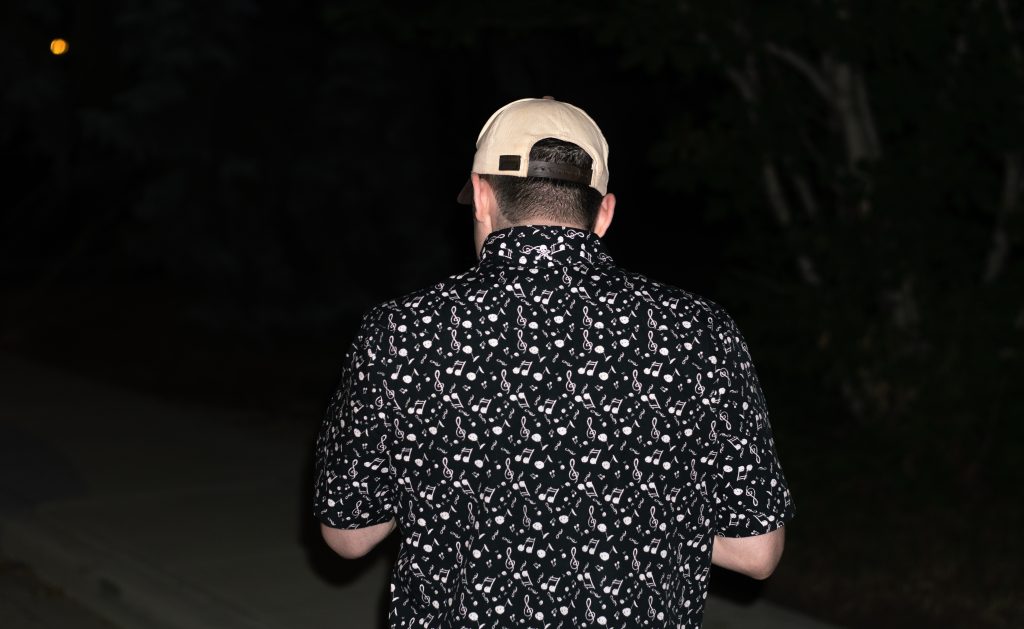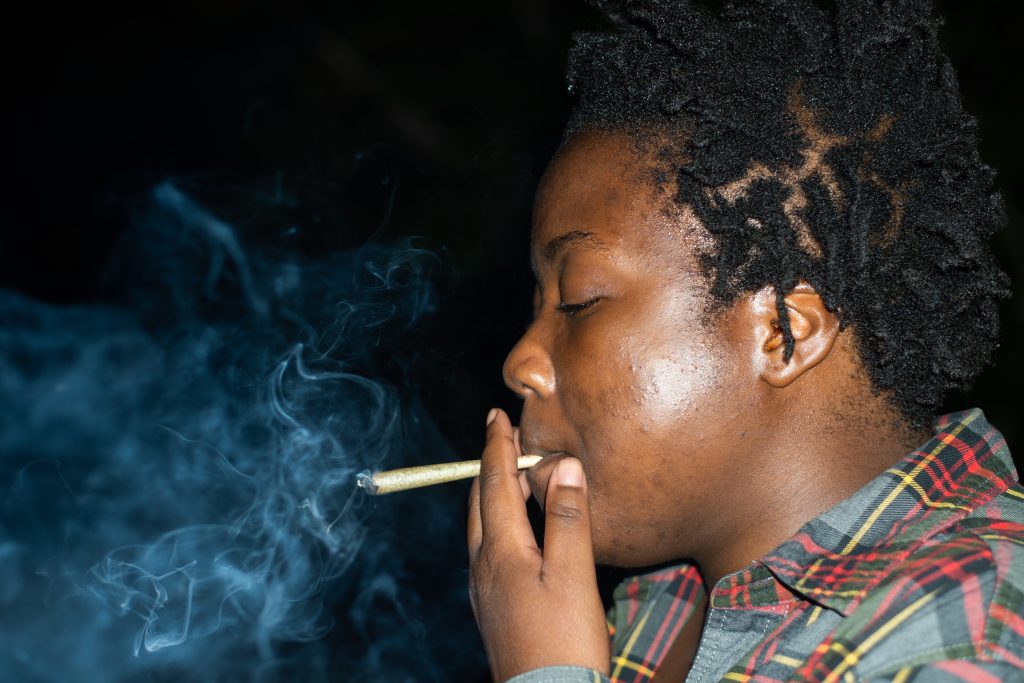 Richard Bagan
Richard BaganAs I walked into the home of Ethan Drory and Tyra Banda, I was immediately greeted by the familiar smell of weed. Banda, a third-year drama student at the University of Alberta, and Drory, a former English major who now studies digital production at Pixel Blue College, share a house off-campus with another roommate who doesn’t usually smoke.
While an episode of RuPaul’s Drag Race played silently in the background, Drory rolled a joint on the coffee table and started telling me about his first time smoking weed. It was in seventh grade at the house of a friend whose mom was dating a dealer at the time. “One day when the house was empty we just went into the sock drawer, rolled a little joint, and smoked it up real quick,” he recalled. “I didn’t feel high, though; that myth was true.”
Banda’s first experience with cannabis was different; she tried an edible at a party on her 20th birthday and wasn’t prepared for the strong effects it had on her. “I was supposed to go to IKEA with my mom in the morning, but I couldn’t cause I woke up still just high out of my mind,” she said.
“It’s hard to get motivated to do things you don’t want to do when you’re stoned.”
Now, Drory primarily uses cannabis in the morning and when he’s producing music, while Banda uses it to help her calm her anxiety and get to sleep. The roommates both use the same dealer.
“I call it ‘Uber Weeds,’” Drory said. “You text the number and then a driver comes and drops it off at your front door, usually within the hour.”
When I was visiting there was some delivery confusion since they both ordered cannabis on the same day at different times. “We get a lot of weed here,” Banda said, laughing.
Drory was quick to admit that juggling academic responsibility with daily cannabis use hasn’t mixed well for him. “One time last year I felt that I smelt too much like weed and I left class,” he said.
Banda nodded. “It’s almost a blessing and a curse,” she added. “It prevents you from doing so many things but it helps so many things at the same time.”
Cannabis holds the spot as the most widely used illicit drug in Canada and worldwide, according to the Canadian Center on Substance Use and Addiction. The drug has been legal for medical use since 2001 and illegally available through an active online and retail black market.
On October 17, 2018, recreational cannabis will be legalized, fulfilling a campaign promise made by Prime Minister Justin Trudeau during the 2015 election. Legalizing the drug will clear the air for new users and blaze a trail for cannabis businesses, more types of cannabis research, and further policy development, but it will also impact students, who will be able to use the drug without being criminalized. What will legalization mean for our campus? The only certainty is that nobody knows how things will develop once cannabis is legal.
Under the new cannabis act, each province has been given the responsibility of establishing their own rules around public consumption, distribution and retail, workplace safety, public health and education, impaired driving, and the choice to raise the minimum age from the federal 18-year-old minimum. Alberta has adopted a public-private hybrid cannabis sale policy; people will be able to buy cannabis through approved private dispensary locations — there are over 240 applicants in the City of Edmonton’s lottery draw for cannabis licenses — but online cannabis sales will be restricted to albertacannabis.org, a website run by the Alberta Gaming, Liquor, and Cannabis Commission.

With legalization imminent, the U of A began planning their own policy through the creation of a cannabis working group in fall 2017. The group was tasked with creating recommendations for the university. An advisory committee, consisting of students, faculty, and staff, was also formed to help provide feedback to the working group. There were differences in opinion within the committee, with some advising tighter restrictions and others advocating for more relaxed regulations.
Elaine Hyshka, an assistant professor and researcher in the school of public health, is one member of the advisory committee. Hyshka is an advocate for more liberal cannabis policies and recommended cannabis legalization in a few papers pubished during her masters in 2008. “I didn’t expect to see this, so it’s very exciting,” she said.
Hyshka was first motivated to research cannabis because of discriminatory criminalization under cannabis prohibition. She said its not fair that young people who are Indigenous or African-Canadian are more likely to be criminalized for using cannabis than a peer who is upper-middle class and white. “We do have evidence showing that those young people are far more likely to be arrested for minor cannabis possession,” she explained.
Hyshka’s research now focuses on understanding how all psychoactive substance use can be approached from a public health perspective. She believes limiting the commercial promotion of cannabis, discouraging driving high, and promoting treatment for students abusing cannabis should be priorities when cannabis is legalized. “The key really is for campus — and also society and the province more wholly — to be really open to evaluating what we do in the early days and to potentially changing direction if it’s not working,” she said.
“Some people have called this the biggest policy change in a generation.”
The working group also heard more cautionary advice from Dr. Katherine Aitchison, who is both a professor and researcher in the department of psychiatry and an adjunct professor in the department of medical genetics. She is also the lead psychiatrist for the Edmonton Early Psychosis Intervention Clinic. Working with other department of psychiatry colleagues, Dr. Aitchison and her team investigated genetic and environmental factors that may lead to early onset of psychotic disorders, including the consumption of cannabis as a teenager.
Dr. Aitchison pointed me to a document released by the Canadian Psychiatric Association in 2017 on the implications of cannabis legalization for youth and young adults that highlighted research findings on early-age cannabis use and the risk for vulnerable people to develop psychotic disorders. Factors may include things like childhood trauma, genetics, and gender — with males having an earlier age of onset. The CPA recommended limiting access to cannabis to people over the age of 21, with restrictions on quantity and THC potency for those between 21 and 25 years of age because of its potential for inducing psychosis — especially schizophrenia — and negative impact on the developing brain.
Another area of concern that Dr. Aitchison noted is the second-hand smoke risks associated with cannabis. When cannabis is burned, it’s thought that it may generate similar chemicals to cigarettes, she said. “Even though we don’t yet have hard and fast data about long-term associations with lung cancer, that might just be a matter of time,” she explained.
Using cannabis regularly can also place people at a higher risk of accidental injury, cannabis use disorder, and respiratory effects like chronic bronchitis. According to Statistics Canada, accidents are the number one cause of death in adults of student age nationally. Dr. Aitchison also told me that cannabis consumption is associated with a fourfold increased risk of collision when driving a motor vehicle in Canadian data.
“Give yourself a really thoroughly informed choice [about whether to use cannabis],” she cautioned. “Otherwise your body may be led down a path that you regret taking.”
Andrew Leitch, the director of the U of A’s enterprise risk management programs, co-chairs the working group along with Kevin Friese, the university’s assistant dean of students (health and wellness). Townhall consultations and online surveys gave the group over 2,500 responses from the university community which, along with input from the advisory committee, directly informed their recommendations. The university administration has accepted the group’s recommendations, however, how they will utilize them depends on Edmonton city council’s new public smoking bylaw, which increases its smoking ban of five meters away from doors, windows, bus stops, and patios to 10 meters for cannabis and tobacco, and bans smoking cannabis from the majority of the city’s parks.
“Some people have called this the biggest policy change in a generation,” Leitch said. “So I think the university at all levels has an opportunity to help society do this properly.”
While the working group recommends the university acknowledge that cannabis isn’t a benign substance and that harm reduction strategies need to be taken, they also stress that members of the campus community are adults who are capable of making their own decisions.

Some of the major recommendations the working group has submitted include:
- banning smoking, growing, and cooking cannabis in residence
- creating designated zones on campus where cannabis vaping and smoking will be permitted
- banning any form of cannabis consumption at university and student group events on or off campus, for at least the first year
- prohibiting sales, advertising, branding, and sponsorship of cannabis products on campus.
Cannabis legalization has created a unique policy challenge for university administrators as they try to anticipate what effects the drug will have on the campus community. The cannabis working group plans on revisiting their policy recommendations six months and a year after legalization to ensure they get things right.
“We’ve certainly been aware of the fact that no matter where we land at the end of the day on the recommendations we’ll never make everybody happy,” Friese said.
Back on the couch with Banda and Drory, we chatted about the way legalization will affect their lives as smoke clouds blurred the room. While they’re “super pumped” for weed to become legal, social and institutional stigma is something that cannabis users may never evade, even with legalization. Despite this, legalization will undoubtedly transform how people access cannabis.
“No one’s going to go to a dealer if you can just go to an establishment,” Drory said. “Uber Weeds might start to exist.”
As we sat there, I thought about how the world might look once the proverbial floodgates are opened. Will this indeed turn out to be the biggest policy change of our generation?




